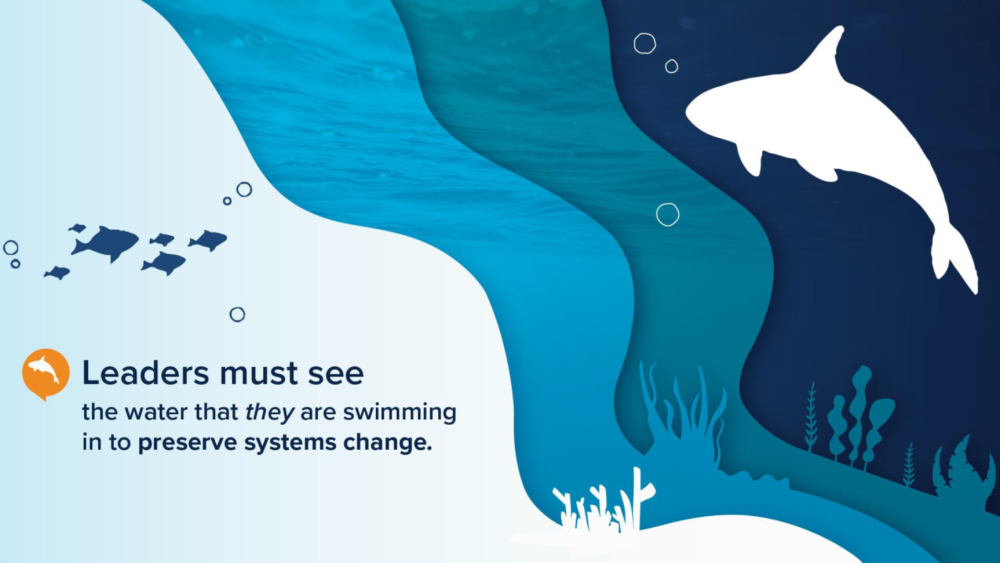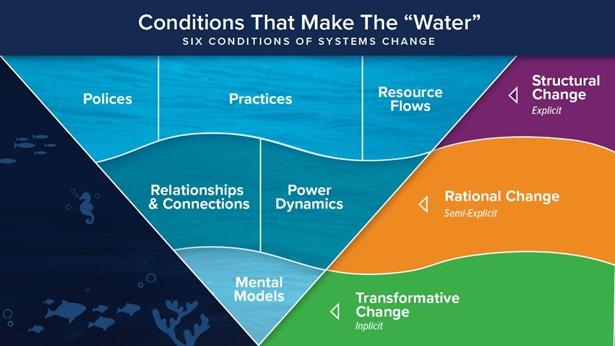
Kin-first Systems Spotlight: Navigating the Waters of System Change: A Framework for Kin-first Culture
Imagine a fish, swimming along, when another fish approaches and asks, "How's the water?" The first fish, perplexed, responds, "What's water?" This exchange encapsulates the essence of our collective struggle to recognize the systems that shape our reality and navigate them with intentionality. To truly effect change, we must first understand the waters we're navigating.

At the heart of our mission lies Kin-first Culture, a concept that prioritizes preserving familial bonds and community connections within the child welfare system. When children experience abuse or neglect at home, interventions must prioritize maintaining familial connections whenever possible to foster healing within the fabric of kinship networks.
Our journey toward Kin-first Culture is guided by the Waters of Systems Change Framework: a comprehensive approach that identifies key indicators for transformation within systems. This model provides a metaphorical framework for understanding the complex dynamics involved in creating systemic change. Just as fish navigate through water, leaders must comprehend the environmental factors surrounding their initiatives to effectively catalyze lasting transformation. This model emphasizes the importance of recognizing the interconnectedness of various elements within a system. By understanding these dynamics, leaders can strategically navigate the currents of change, anticipate potential obstacles and leverage opportunities to drive meaningful and sustainable impact. In essence, the model highlights the need for leaders to develop a deep awareness of the context in which they operate, enabling them to navigate and shape the waters of change more effectively.

Let us dive into these indicators and consider how they can help us achieve our vision.
Policies
- Crafting policies and protocols that uphold equity for children in kinship care, acknowledging their distinct needs.
- Collaborating with local authorities to streamline access to criminal background checks, ensuring timely information for placement decisions.
- Implementing safeguards, such as additional approval processes, to prioritize kinship placements and catalyze systemic transformation.
Practices
- Establishing dedicated teams to identify kinship families at the onset of a child entering care, and evaluating their ability to offer safe and nurturing environments.
- Implementing a 24/7 support system to provide continuous assistance, including supervision, conflict resolution, respite care, and retention support for kinship placements facing challenges.
- Offering specialized services and guidance from experts in kinship care to ensure tailored support for kinship families.
- Providing post-permanency services and ongoing support to kin caregivers following adoption or guardianship to sustain permanent placements and prevent disruptions.
Resource Flows
- Recognizing that the cost of raising children remains consistent regardless of kinship status, advocating for equitable financial support and services for kinship families, parallel to those provided to non-kinship foster families.
- Allocating resources to prioritize kin placements as the primary option whenever feasible, including the establishment of kinship coordinators tasked with locating and supporting prospective kin caregivers.
- Acknowledging the labor-intensive nature of emergency kin placements, ensuring child protection staff receive the necessary support from within the system to conduct thorough family assessments, complete background checks, and make informed placement decisions.
Relationships & Connections
- Cultivating community partnerships to ensure kinship families have access to tailored services and supports that address the specific needs of the child while promoting culturally responsive care that respects each family's ethnic and cultural heritage.
- Encouraging various public systems, including schools, early childhood programs, economic security agencies, housing authorities, and aging services, to recognize the vital role of kinship foster parents and facilitate their access to necessary services and support for the children in their care.
- Advocating for mandated reporters to adopt a proactive approach by asking one more question, thereby gaining a deeper understanding of family circumstances and potentially identifying cases of abuse or neglect early on, rather than solely relying on child welfare services to initiate inquiries.
Power Dynamics
- Engage casework staff actively in the process of transitioning to a kinship-first culture to ensure their insights inform decision-making processes.
- Encourage judges, attorneys, and Court Appointed Special Advocates (CASAs) to consistently inquire about and emphasize the significance of family connections during court proceedings and in advocating for children and parents, while holding agencies accountable for actively seeking and involving kin.
- Recruit and welcome input from family members, service providers, and individuals with lived experience to influence systemic changes, ensuring that diverse perspectives are considered in driving transformative shifts across the entire system.
Mental Models
- Embrace the belief that the best interests of the child are served by maintaining familial connections whenever possible, recognizing that within every family exists someone who possesses the strength and skills necessary to provide care within their extended kinship network.
- Envision a culture where children are routinely integrated into their family systems, even if circumstances necessitate they cannot remain in their original homes, thereby preserving their sense of identity and belonging.
- Advocate for a systemic approach that actively engages all relatives in decision-making processes from inception to resolution, ensuring families are not fragmented but supported in their journey toward healing and resilience.
As we navigate these Waters of Change, it's essential to recognize that transformation requires collective effort. By aligning policies, practices, resource allocations, and mental models with the principles of Kin-first Culture, we can create a system that not only responds to crises but actively fosters healing and resilience within families and communities.
Each action we take, no matter how small, has the potential to ripple outward and effect profound change. Together, let us dive deeper into the Waters of System Change, guided by the currents of compassion, equity, and kinship.
Sharing Family Stories
The CFE Family Stories series debuts with an emotional story from a parent partner turned social worker who, 10 years earlier, had her children removed from the home. Many of her kids were placed in separate homes and difficult to stay in touch with for more than one hour a week, resulting in additional trauma to the children and family, while her daughter was placed with a grandparent. This story looks at the enormously positive impact being place within the family had on her daughter.
Microlearning: Storytelling Through Data
Through engaging scenario videos and data narrative illustrations, this interactive training will deepen your understanding of the importance of the Kin-First Culture and set you up with new tools to apply it effectively in your work environment.
Learn More
Visit our website for additional resources, information, and training opportunities.
Stay in the Loop
Join our mailing list to be notified as soon as new information becomes available
Spread the Word
If the information in this article looks like something one of your colleagues can benefit from accessing, please share along!
